You may have been to many countries around the world, spent a lot of time to learn about them before your trip started, in order to get to know the destination. But most of our understanding about Iran is relatively limited to what we get from media and propaganda about how dangerous or difficult is to travel to Iran. But in reality, Iran is such an incredible country to travel. The history of Iran, the culture of Iran , architecture, and Iran’s natural attractions will fascinate you. The friendliness of the people will leave you speechless and the culture is amazing! Here is a list of essential Iran travel tips 2024 and information that you need to know before you travel to Iran:
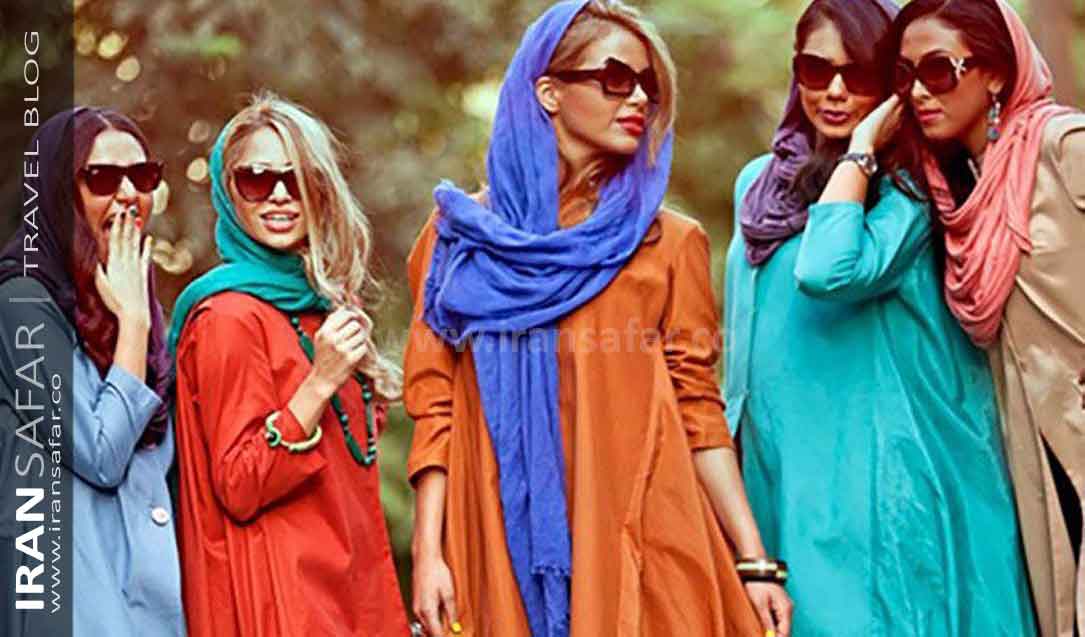
Iran Travel Tips & Information
Are you planning travel to Iran? This ancient land of rich history, diverse culture, and breathtaking landscapes awaits you. However, before you embark on your adventure, there are essential things you should know to make your trip safe, enjoyable, and unforgettable. In this article, we will guide you through everything you need to know before traveling to Iran, ensuring that you are well-prepared for an enriching experience.
Safety in Iran
Contrary to the negative propaganda of some Western media, Iran is a safe country and does not pose any threat to citizens and tourists. In recent years, despite the rise of terrorist groups such as ISIS and the Taliban in the Middle East and some of their attacks in the heart of Europe, Iran has been immune from such anti-human rights practices and is renowned as the safe island of the Middle East. Despite the relatively insecure situation that there is in the world today, no serious terrorist incident has been reported in the country.
Note: Always carry identification and emergency contact information. While incidents are rare, it’s better to be prepared.
Also Read – Is Iran Safe to Travel in 2023?
Iranian Hospitality
Is making friends safe in Iran? Iranian hospitality is highly reputed and considered one of the finest examples of warm and welcoming cultural practices in the world. In Iran, hospitality is deeply ingrained in the country’s rich cultural heritage and is seen as a core value that reflects the nation’s kindness, generosity, and respect for guests. Iran’s culture is deeply rooted in its rich history, and people take great pride in their traditions. When travel to Iran, it is crucial to respect and appreciate their customs. Greetings are an essential part of Iranian culture, and a warm smile and handshake are often well-received. However, refrain from physical contact with members of the opposite sex in public spaces.
Iranians believe in the concept of “Mehman Nawazi” which translates to “guest hospitality.” It is a sacred duty to treat guests with the best possible treatment and to ensure their comfort and well-being during their stay. While in Iran as a tourist, you may come across with some new aspects of hospitality that you should expect as a normal and safe thing – such as: Invitation to their homes, gift-giving, offering refreshments, and insistence of staying after you accept the invitation!
Iran Dress Code
As a tourist traveling to Iran, it’s important to be aware of the country’s partly conservative dress code, which is influenced by Islamic customs and principles. However, the Iranian veil differs greatly from what is used in some other Islamic countries and is more variable and colorful.
Under Iranian law for men, wearing shorts is not legal and trousers that are too short, though not legally prohibited, is not accepted in public places. It is necessary to cover some of the hair for tourist women in Iran. It is advisable for female visitors to have a head scarf in their handbag to be used as soon as they arrive in Iran.
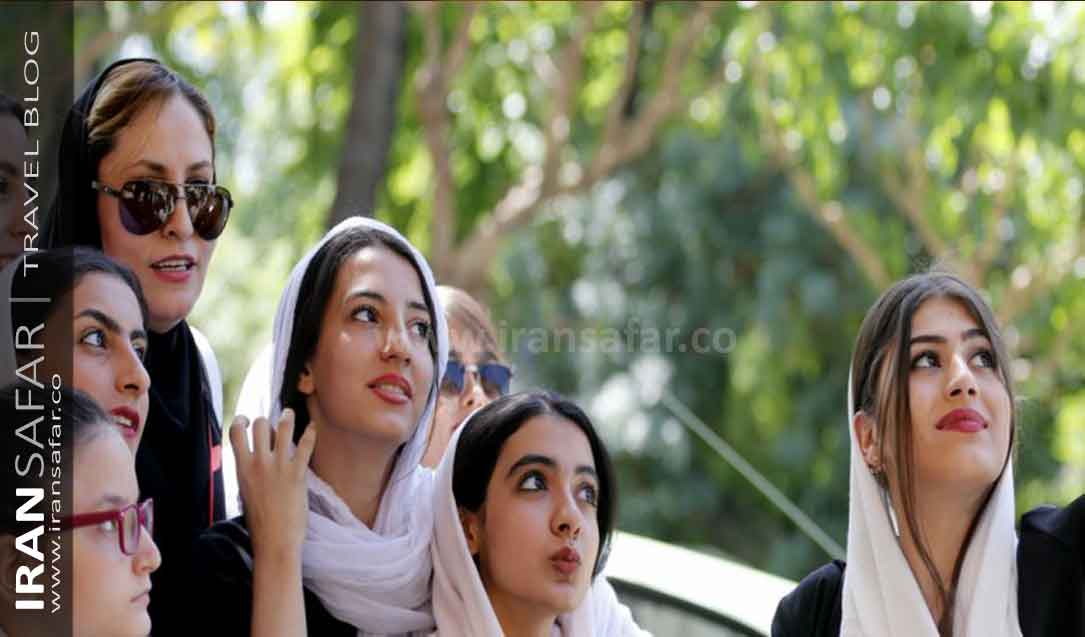
This dress code applies to both men and women. Here are some guidelines on how to dress appropriately as a tourist in Iran:
Women: All females over the age of nine must wear a hijab, the Islamic dress. There is no uniformity, however, regarding its type and the amount of coverage it provides. The black chador (the loose head-to-toe covering) isn’t compulsory. The most common wear is manteau , a knee-length, sleeved overcoat, an overwhelming array of which is readily available in the shops. If you don’t want to buy any, prepare a loose tunic or blouse that covers the hips and rear; these can be worn with a long skirt or trousers (jeans are acceptable). Hair must be covered with a scarf. For women, there are many fashionable and colorful headscarf options available that can still comply with the dress code while expressing personal style. The colors of the clothes do not really matter. If you travel in summer, light fabrics and sandals are strongly recommended.
Men: There are few restrictions about men’s dress. Only shorts, even knee-length, are unacceptable. T-shirts and shirts with short sleeves are fine.
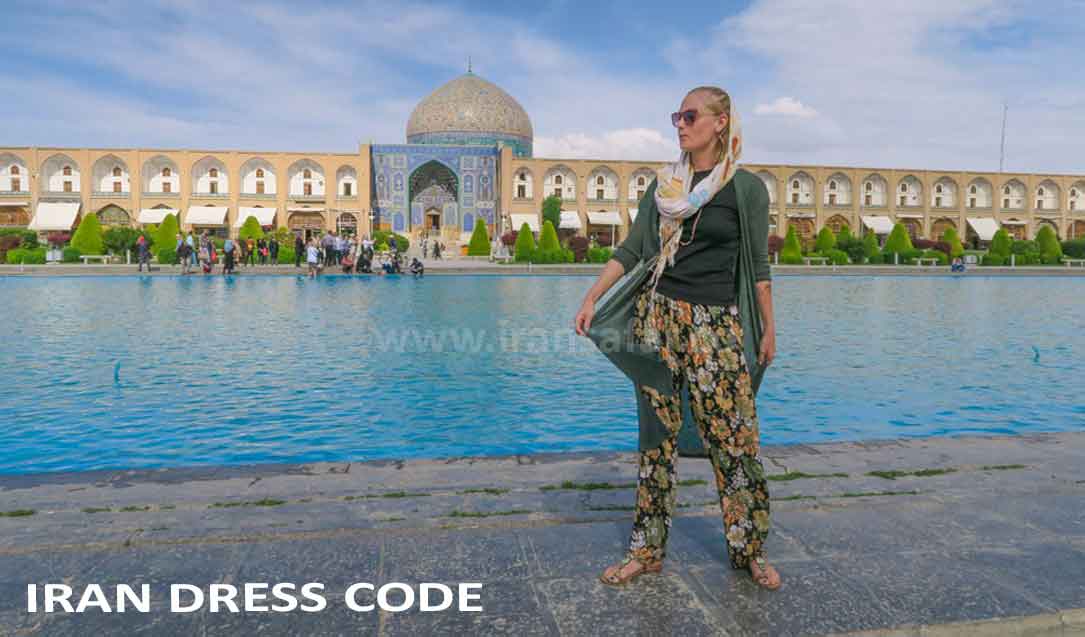 photo from againstthecompass.com
photo from againstthecompass.com
General Considerations
In places with stricter dress codes, such as holy shrines or some religious sites, it might be required to wear a chador (a full-body black cloak) for women. They usually offer this item at the spot and you do not need to prepare it in advance.
When entering mosques, both men and women are expected to wear modest clothing that covers their arms and legs.
It’s essential to respect and adhere to these dress code guidelines while in Iran to avoid any potential issues and to show respect for the country’s culture and customs. Many Iranians are understanding towards tourists and will not be overly strict in enforcing dress code rules for foreigners. However, it’s still important to be mindful and dress appropriately, particularly in more conservative areas.
Keep in mind that dress code rules in Iran might evolve over time, so it’s always a good idea to check for any updated information or guidelines from official sources before traveling to the country.
Iran Visa Requirements and Application
Before traveling to Iran, ensure that you have obtained the appropriate visa. Depending on your nationality, the visa application process may vary, so it is best to check with the Iranian consulate or embassy in your country for specific requirements. Additionally, make sure your passport has at least six months validity from your planned departure date, and consider purchasing travel insurance for added security. Obtaining Iran visa is very easy and quick if you apply in a right way. Here is a guideline to obtain your Iran visa online:
Internet in Iran
There is internet in almost everywhere in Iran (except for the depths of mountains and some remote villages) and it is very easy to access. As soon as you get off your plane, try to buy a local SIM card at a very reasonable price (approx $2.00). Once you have activated your SIM card, you will be provided with high-speed Internet access and will be able to stay in touch with your family and friends with audio and video applications. Carrying a passport to buy a tourist SIM is necessary.
In Iran, three main operators are providing telecommunication and internet services. “Hamrah Aval” and “lrancell” offer exclusive services to tourists.
Iran Currency System
When you travel to Iran, you can use US Dollar. Euro, Pound to pay for some travel expenses, such as your accommodation fare or a taxi that will take you from the airport to the hotel or to but souvenirs. But for most costs, you need to exchange your money into Iranian Rial (IRR). There are currency exchange places at Iran’s international airports and in the central parts of Tehran. Hotels also have this facility. Authentic currency exchanges are also available in all major Iranian cities where you can use their services, but keep in mind to avoid street individual illegal money exchanges which will put you in a big hassle of misunderstanding, rate miscalculation, and being bamboozled.
What is Iran’s currency? Rial or Toman
The official currency of Iran is the Iranian Rial (IRR). However, there is also a unit of currency used informally in daily transactions known as the Toman. The Toman is not an official currency; it is simply a way of expressing prices by removing zeros from the Rial.
It’s important to pay attention to whether prices are quoted in Rials or Tomans to avoid confusion when making purchases or transactions in Iran. In formal settings and financial contexts, prices are usually quoted in Rials, but in everyday conversations and local markets, you may hear people using Tomans.
Iranian Toman: When talking money in Iran you may hear the term “Toman” instead of “Rial”. The Toman is an old term but is no longer an official currency. Although the “Toman” is no longer an official unit of Iranian currency, Iranians commonly express amounts of money and prices of goods in “Tomans.”
To clarify, 1 Toman is equal to 10 Rials. So, if you hear people in Iran talking about prices in Tomans, they are essentially referring to the same currency, but the amount is expressed in a more convenient and less cumbersome manner.
For example:
10,000 Rials = 1,000 Tomans
50,000 Rials = 5,000 Tomans
100,000 Rials = 10,000 Tomans
Iranian money exchange rate on internet
Since Iran has been under the US sanctions, there is no connection between Iran’s central bank and the global banking system since 2016. Therefore, when searching for the exchange rate in Iran you will find the rate which is actually the rate of 2016 – which is far from the actual rate! In order to know the live rate IRR please check the website of the Central bank of Iran.
Read more – Iranian Currency
Iranian Cuisine
Iranian cuisine is a delightful fusion of flavors, incorporating aromatic herbs and spices. Iranian Food is one of the world’s finest. The foundation of most Iranian dishes is rice, meat, and salad, often served with a side of fresh herbs, cheese and yogurt. While traveling to Iran, you will be welcomed by a wide range of delicious delights including some of the most popular Iranian dishes. Don’t miss the opportunity to savor dishes like Kebabs, Ghormeh sabzi, tahchin, Samousa, and Felafel. Saffron ice cream also blink at you!
When dining in Iran, it’s common to share meals, and the Iranian hospitality will make you feel like a part of the family. Just take a look at the vast map and geography of Iran, you will find out where the origin of this unique variety is! The existence of several different climates adds to the variety of Iranian cuisine. Together, these facts have influenced Iranians to create a rich and unique food culture.
Also Read: Persian Cuisine
How is Iranain Food?
Iranian food is not generally considered to be very spicy in the way that some cuisines, such as Indian or Thai, are known for their intense spices. Overall, Iranian food is known for its harmonious balance of flavors, the use of quality ingredients, and the careful attention to preparation. Some common Persian spices and herbs used in Iranian cooking include saffron, turmeric, cinnamon, cumin, cardamom, cloves, and dried limes. These ingredients contribute to the rich flavors and distinctive tastes found in Iranian dishes.
Also Read : Best Iranian Dishes by Louisa Shafia
The key characteristics of Iranian food
Rice: Rice is a staple food in Iran, and it is prepared in various ways, including “Chelo” (plain steamed rice), “Polo” (rice mixed with herbs, fruits, or vegetables), and “Kateh” (a type of plain rice cooked until the grains are softer).
Kebabs: Iran is famous for its succulent and flavorful kebabs made from marinated and skewered meat (usually lamb, chicken, or beef). These are often served with saffron-infused rice and grilled tomatoes.
Stews: Iranian stews, known as “Khoresh” or “Khoresht,” are a central part of the cuisine. They are hearty dishes made with a variety of ingredients like meat, vegetables, herbs, fruits, and beans, often simmered in a flavorful sauce. “Ghormeh Sabzi” and “Fesenjan” are popular examples of Iranian stews.
Herbs and Greens: Fresh herbs and greens are widely used in Iranian cuisine. Parsley, cilantro, mint, dill, and fenugreek are just a few examples of the herbs commonly added to dishes for their vibrant flavors.
Saffron: Iran is one of the largest producers of saffron in the world, and this prized spice is extensively used to add a distinctive aroma and color to various dishes, including rice and desserts.
Flatbreads: Bread is a staple in Iranian meals, and “Naan” or “Barbari” are popular types of flatbreads that accompany many dishes.
Desserts: Iranian desserts often feature a delightful blend of sweetness, nuts, and aromatic flavors. Examples include “Baklava,” “Gaz,” and “Sohan.”
Tea: Tea, usually black tea served with sugar cubes, is the most popular beverage in Iran and is an integral part of Iranian hospitality.
Halal food in Iran
According to Iranian and Islamic regulations, only halal food is offered in Iran. Halal food is not served with alcoholic beverages. The meat and chicken that is to be used for cooking meat is slaughtered in a special Islamic way. Also meat of some animals such as pork, dogs, mice, etc. are not eaten in Iran because of being not Halal.
Also Read : Best Restaurants in Shiraz
Accommodation in Iran
Iran offers a variety of accommodation options to suit every budget and preference. From luxury hotels to budget-friendly hostels and traditional guesthouses, you’ll find a wide range of places to stay. For a unique experience, consider staying in historic famous caravanserais of Iran, which have been transformed into charming lodgings. In Iran’s tourist destinations, it is common for natives to rent their homes to travelers. This type of residence may cause problems with accident insurance or some safety issues. So, while in Iran, try to stay in places that operate under the Iranian Ministry of Tourism: Certified hotels, guesthouses, hostels, eco-lodges and local houses that are among the approved venues. If you are traveling on a tour, trust your travel agent or tour guide about accommodation.
Read : Best Hotels in Iran 2023
Iran’s Health and Medical Facilities
Iran has a reasonably well-developed healthcare infrastructure with numerous hospitals, clinics, and medical facilities across the country, including in rural areas. This country enjoys a strong emphasis on medical education and produces skilled healthcare professionals, including doctors, nurses, and specialists. There may be disparities in the quality of healthcare services between urban and rural areas, with urban centers having better access to advanced medical facilities and specialized care.
As with any country, if you plan to travel to Iran or require medical attention while there, it’s advisable to have travel health insurance and research the specific healthcare options available in the areas you intend to visit. For serious medical conditions, it’s always recommended to consult with medical professionals and international health organizations for the most up-to-date and accurate information.
Also Read : Iran Medical Toursim
Language and Communication in Iran
While Persian (Farsi) is the official language of Iran, many Iranians also speak English, especially in tourist areas. Learning a few common phrases in Farsi can go a long way in enhancing your travel experience and connecting with locals.
Also Read : Iran Ethnic Groups
Transportation in Iran
Iran has a well-developed transportation network that allows you to traverse the country efficiently. Domestic flights and trains connect major cities, making long-distance travel convenient. Within cities, public transportation and taxis are readily available and affordable. Also there is good city-to-city bus system all over the country.
Iran has a fairly extensive road system that covers a significant portion of the country. The road network is one of the most important transportation infrastructures in Iran, connecting major cities, towns, and rural areas across the vast landscape of the country.
Also Read : Train Travel in Iran
Travel to Iran with my own car
Iran Travel Tips: In case you travel to Iran on your own vehicle, please note:
Traffic Conditions: Traffic congestion can be an issue, especially in major cities during peak hours. Tehran, as the capital and largest city, is known for its heavy traffic. However, efforts have been made to improve traffic flow and infrastructure in congested areas.
Safety: While efforts have been made to improve road safety, it’s essential to exercise caution while driving, because traffic accidents are very common in Iran, especially on rural or poorly maintained roads. Road safety standards may vary from international norms, so it’s advisable to drive defensively and be aware of local driving practices.
Roadside Facilities: Along major highways and popular routes, you can find various roadside facilities, including gas stations, rest areas, restaurants, and accommodations. But on remote roads, please make sure about facilities and the safety.
Seasonal Considerations: In some regions, such is westernmost and easternmost parts of Iran, extreme weather conditions, such as snow and sandstorms, can affect road conditions during certain seasons. It’s important to check weather forecasts and plan accordingly.
The road conditions and infrastructure in Iran change over time due to ongoing development projects and improvements. As with any travel destination, it’s recommended to stay informed about the latest road conditions, travel advisories, and local driving regulations before embarking on a road trip in Iran.
Iran Tours
Travel to Iran reveals a country that is mesmerizing, exotic, exciting, and mystical. Visiting Iran on a tour can offer numerous advantages that enhance the overall experience of visiting this culturally rich and historically significant country. Some of the key advantages of traveling to Iran on a tour include:
Efficient Itinerary Planning: Tours are designed with carefully planned itineraries, allowing you to maximize your time and visit key attractions without worrying about logistics and transportation arrangements.
Access to Hidden Gems: Experienced tour guides can take you to lesser-known but equally fascinating places that may not be easily accessible to independent travelers.
Safety and Security: Tour operators are familiar with local conditions and safety protocols, providing a sense of security and peace of mind during your journey.
Cultural Etiquette Guidance: Iran has its own unique cultural norms and etiquette. A tourist guide in Iran can help you understand and respect these customs to ensure a more immersive and respectful experience.
Time and Energy Saving: A tour eliminates the need for extensive research and planning, saving you time and energy in organizing your trip.
However, it’s essential to choose a reputable and responsible Iranian tour operator that aligns with your travel preferences and values. Before booking a tour, read reviews, compare different tour packages, and ensure that the operator adheres to ethical and sustainable travel practices. This way, you can make the most of your trip to Iran and create cherished memories of this captivating destination.
Here is a list of our highlighted Iran Tours:
Also Read – Iran’s top ten places to visit
Tipping in Iran
In Iran, it is not mandatory but has become common to tip people who provide service, such as waiters at restaurants, hotel bellboys, guides or tour drivers. At the airport the luggage carts are free for anyone to use but if you get assistance from someone with the cart, you should tip him. People generally leave 10% Tip in fancy restaurants.
Toilets in Iran
There are western type of toilets in many hotels and tourist destinations and you will not have any problems. But in most public places there are no sitting toilets and you have to use a squat toilet. squat toilet (also known as a squatting toilet) is a toilet used by squatting, rather than toilets at public restrooms on the roads and restaurants. The toilet is set on the floor and has no seat. Today, all toilets have a water hose. Keep in mind that in most public toilets in the city and between roads, paper towels do not exist
Alcohol and Drug Law in Iran
Under Iranian law, the transportation and use of alcohol and drugs, including Marie Joanna, is prohibited in public places, and there is no official service center for its customers. However, in Iran, as in many countries, the trafficking and distribution of banned items is a significant social disadvantage.
Bargaining and Shopping Tips
Bargaining is a common practice in Iranian markets and bazaars. Polite haggling can be an enjoyable experience and may result in unique souvenirs at reasonable prices. when you travel to Iran, it is recommended to visit the best bazaars of Iran which are very different from anywhere else in the world!
Best Time to Visit Iran
Iran experiences a diverse climate, ranging from hot summers to cold winters. The best time to visit depends on your preferences and the regions you wish to explore. Spring (March to May) and autumn (September to November) are generally considered the most pleasant times to travel, with mild temperatures and colorful landscapes. However, if you enjoy winter sports, the Iran ski resorts offer fantastic opportunities during the colder months.
Also Read : Iran Climate
Iranian people
Iranians are proud of their country, nationality, history and their traditions. Kind, warm, friendly, helpful, proud, and generous people that only one thing ties them all together, and that’s Iran. Although they have not had a great number of visitors in most parts of Iran since 1979, they remain respectful and curious towards tourists. They would welcome you, thank you for visiting and ask you questions.
Hospitality and the expression of friendly feelings is the most prominent moral characteristic of Iranians. So if you come across Iranians who invite you to their home, give you something as a reminder, get excited about seeing you, take a picture with you, shake your hand And give you a hug, don’t be surprised.
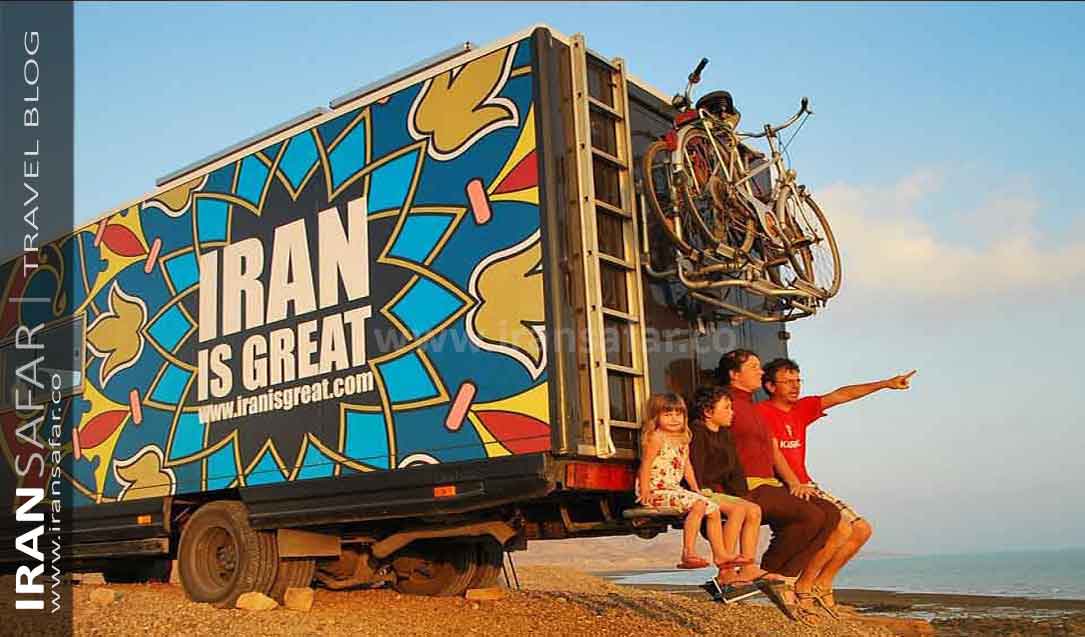
Also Read : Things that you only see in Iran!
Iran DOs and DON’Ts
Before you travel to Iran, it’s necessary to know Iran Dos and Don’ts:
Staring at people, especially Iranian women, kissing, and hugging in public places is incompatible with Iranian public culture. Also, shaking hands with opposite sex is not very popular in conservative cities of Iran. When photographing people, especially if the subject is an Iranian citizen, it is best to get permission. Like many people in the world, Iranians like to respect their privacy.
Here is a list of some cultural dos and don’ts in Iran:
1Alcohol in Iran
Alcohol is banned in Iran, and don’t try to bring alcohol into the country.
2
No Handshake Always!
Don’t get misunderstood! Again because of being an Islamic state, conservative and religious Iranians do not shake hand with their opposite gender. Handshaking is between two men or two women especially in public. So if you are meeting elder people, an Imam, or religious friends let them to decide to handshake or not. So don’t judge, it’s their culture and doesn’t mean the person you are meeting is impolite or rude.
3
Persian Gulf or Arabian Gulf?
Historically, due to long-lasted vast Persian Empire, the most important and strategic Gulf of the Middle East has been called the “Persian Gulf‘” in all documented geographic evidences. Since 1970s some Arab nations located on the opposite side of the Hormuz strait started to call it the Arabian Gulf. But do not try to do so in Iran, since people are sensitive about it. As Iranians say, it’s the “forever” Persian Gulf!
4
Laws on Iranian Sea shores
According to the Iranian law, swimming or sunbathing on beaches of Iran is allowed for men and women in special separate sections on beaches. Walking on the beach, of course, is not subject to gender segregation. There’s also the issue of using the hotel pool, they have different time tables for men and women.
Public display of affection
While in Iran, you’d better not to display affections in public such as kiss, hug, or putting your arm around your loved one in public in some small towns which are usually more conservative. Holding hands is OK.
Do not throw toilet paper in the toilet
A self-explanatory one, but the toilet paper is pretty thick and will quickly get stuck in the pipes. Unless you want to risk an overflowing toilet, you must throw the toilet paper in the wastebasket.
Wearing shoes indoors
If someone invites you to their home, make sure you take your shoes off before entering. Iranians wear house slippers indoors and are sure to offer you a pair too. You’re welcome to take them or decline and walk around barefoot or in socks.
8
Be careful with Ta’arof!
This is a polite exchange that takes place in all aspects of life in Iran, in shops, in streets, in businesses, at homes. Simply stated, it is a form of one person making an offering and the other, refusing it. This custom may repeat itself several times before the individuals finally determine whether the offer and refusal are real or simply polite. Be very careful how and with whom you taarof so that it does not interfere with your stay. Use common sense as to when to do it and when not to.
9
Photography Guidelines
Iran’s architecture and landscapes are incredibly photogenic, but remember to ask for permission before taking photos of people, especially in more conservative areas. Some locations may require a special photography permit.
10
Mosques & Holy Shrines
In the Iranian culture, mosques, shrines and cemeteries are respected and their visit, like all other religious sites around the world, requires respectful behavior and humility. Prayer halls of mosques are usually covered with carpets where wearing shoes is not allowed.
Iran Travel Blog
For more Iran travel tips and ideas about Iran and how to travel to Iran please read our Iran travel blog articles:
Iran Travel Tips – FAQs
What should I wear in Iran?
Please refer to the main text above: IRAN DRESS CODE.
Can Americans apply for Iranian visa?
The short answer is yes. Visa procedures have been considerably simplified during recent years. All nationalities except Israelis are allowed to apply. US residents have to refer to the Iranian Interests Section of the Embassy of Pakistan, Washington DC. As you may know, Americans, British and Canadian nationals require to book a tour from arrival to departure; essentially this means you need a certificated guide while you are in Iran. Citizens of these countries need to have a confirmed itinerary, which should be requested from a valid tour company. For this, they should send a passport copy, ID photos, and a profession & educational CV to the Iranian tour operator. Typically, getting the Visa authorization code for these applicants take around 30 working days.
Can I drive my own car in Iran?
To bring your own vehicle into Iran, you must be more than 18 years old and have a valid international driver’s license. For the vehicle, you will need car registration papers, a nationality badge, a red warning triangle, and a carnet de passage ) temporary importation document) which can be obtained from the relevant international automobile organization in your country. Third-party insurance is compulsory for all- make sure that your policy is valid for Iran and accredited with Iranian insurance companies. Otherwise you will have to buy insurance at the border. The only tax the driver pays is the fuel tax. At the border, the officials will probably note the details of your vehicle in your passport to make sure you don’t leave the country without your vehicle. Three months is the current time limit for driving a foreign car in Iran. For a period of more than ten days, you should obtain a temporary license plate for your car.
Which season is the best to visit Iran?
Spring and autumn are the best times to travel around central, western and northern Iran and to see the most interesting cultural attractions of this wonderful country. Only visits to the coast of Persian Gulf are best made in winter when humidity and heat levels are at their lowest.
Can I drink alcohol in Iran?
According to the Iranian Islamic rules, all alcohol is banned and if you take any alcoholic drink with you, it would be confiscated at the border or in the airport.
Is Iran safe to travel?
Any crime carries severe penalties in the Islamic Republic of Iran. On the other hand Because of great influence of Islamic beliefs and off course importance of decency in Iranian culture, this country is one the safest. It is likely that the greatest danger you face (other than crossing the road!!) is having your purse or camera snatched, especially in Isfahan.
How can I visit Iran as a solo female traveler?
Traveling to Iran as a solo female traveler is pretty safe, but does require some preparation. First of all, you need to know about the conventional covering in Iran and the dress code. Also, you’d better learn some essential Farsi words and phrase in order to be better understood.
While in Iran, you would get surprised but will feel comfortable with Women Sections in public buses or Metro. The metro has its own women carriages! There are separated checkpoint entrances at airports and railway stations for women.
Most men in Iran will treat you with respect and sexual harassment is rare in Iran but keep some considerations that you actually follow when you travel alone as a woman: Avoid walking alone at night, dress modestly, and preferably don’t accept invitations from people you don’t know.
What are cultural DOS and DON’TS in Iran?
Eating, drinking or smoking in public during daylight hours of the 28 days of Ramadan is not acceptable. Entry into a “working” religious building or into a private home entails removing shoes at the edge of the carpet, rug or floor covering to prevent street filth being brought in. In a public city bus, usually passengers sit according to gender and there is a man section and women section. As in some other Islamic countries homosexuality does not occur and such behavior is forbidden and illegal. Note that men in Iran often hold hands and embrace each other, but this has no sexual connotations.
Is any international credit card acceptable in Iran?
No, international credit / debit cards don’t function in Iran due to sanctions. Only some souvenir shops in Shiraz and Isfahan which have connections to Emirate banks accept them. So it’s better to take cash money with you.
How is Iranian cuisine?
Iranian cuisine offers some of the best dishes in the world. The Persian cuisine consists of a delicious array of stews and different rice among many other dishes. And of course Persian bread; These used to be all made inside brick ovens (Tanoors) by hand but machines have taken the place of many. Still, Persian breads are a part of any good meal and they are simply delicious. Persian sweets and pastries are absolutely wonderful and you can find pastry shops in every corner of main streets. If you get lucky enough to be invited to someone’s house for lunch or dinner, be sure to pick up a box of fresh pastries at a local shop. Fast food stores abound serving all sorts of creative sandwiches. Don’t be shy to try different things and most certainly don’t stay away from eating real Iranian food. The majority of people in Iran are conscious of properly cleaning fruits and vegetables and general cooking hygiene. Tap water is safe to drink in any part of the country although you might not like the taste in some parts. Bottled water is readily available.
Is tipping common in Iran?
It is common to tip in Iran for certain things such as bellboys, waiters, tour guides or tour drivers. At the airport the luggage carts are free for anyone to use but if you get assistance from someone with the cart, you should tip him. People generally leave 10% Tip in fancy restaurants.
What are national holidays in Iran?
https://www.officeholidays.com/countries/iran/2023
What currency Iran has?
Iranian currency is called Rial – IRR; But when talking money in Iran you may hear the term “Toman”. The toman is an old term but is no longer an official currency. Although the “Toman” is no longer an official unit of Iranian currency, Iranians commonly express amounts of money and prices of goods in “Tomans.” For this purpose, one “Toman” equals 10 rials. Despite this usage, amounts of money and prices of goods are virtually always written in rials. For example, the price sign in a store would state the price in rials, e.g., “20000 Rials,” even though the salesman, if asked, would say the cost “2000 tomans” or simply 2000.
Please note: international credit — Debit cards do not function in Iran due to sanctions. Only some souvenir shops in Shiraz and Isfahan which have connections to Emirate banks accept them. So it’s highly recommended to take cash money with you.
Is Iran Visa Process complicated?
To be honest, despite all the negative press, travel to Iran has become very easy over the past few years, and the Iranian government has made some changes to the regulations in the tourism industry in the hope of attracting more visitors.
How long does it take to get Iranian tourist and business visas?
For most nationals It takes Max. 10 days for a tourist visa and 2 weeks for a business visa.
Can Israeli Citizens Get Iranian Visa?
No – Israeli nationals cannot get an Iranian visa at all.
What is the difference between the Entry validity and the Duration of stay?
The entry validity is calculated from the time of visa issuance and the validity of the stay is calculated from the time of entry, which can be extended but the validity of the entry cannot be extended.
Can I get a regular Iranian visa for countries that are eligible for airport visas?
Yes, All eligible nationals for Iran airport can apply for regular visa at Iranian consulates.
Is it possible to extend my Iranian visa?
Yes, Iranian visas can be extended, depending on the nationality of the guests. Will the refund be paid if the visa is rejected? Yes we guarantee 100% refund of visa service if visa is refused.
Is Iran a safe country to travel?
Yes – Iran is definitely one of the safest countries in the world, you can safely travel in Iran.
Why apply for a visa through Iransafar Tours?
Those who intend to obtain an Iranian visa need to have a sponsor (who invites you) in Iran, lransafar Tours can be your sponsor and will guarantee your visa work in the shortest possible time. Read more – How to get Iran Visa?
Do I need a hotel reservation to get a visa?
If your visa application process is done through lransafar Tours, there is no need to book a hotel, but you need to provide some information on where you stay in Iran to be written on your application form. (Note: US, British and Canadian nationals need to book all hotels in advance)
Do nationals of different countries need a visa to enter the Free Zones of Iran?
No – Citizens of all countries (Except Israel) do not need a visa to enter the Free Zones of Iran.
Where is the nearest Iranian Consulate to Canadian and American Citizens?
The closest embassy is the Embassy of Pakistan in Washington DC (Office for the Protection of Iranian Interests) in Washington DC. The visa service can be done via express courier service.
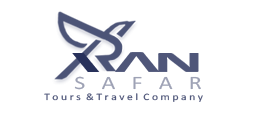

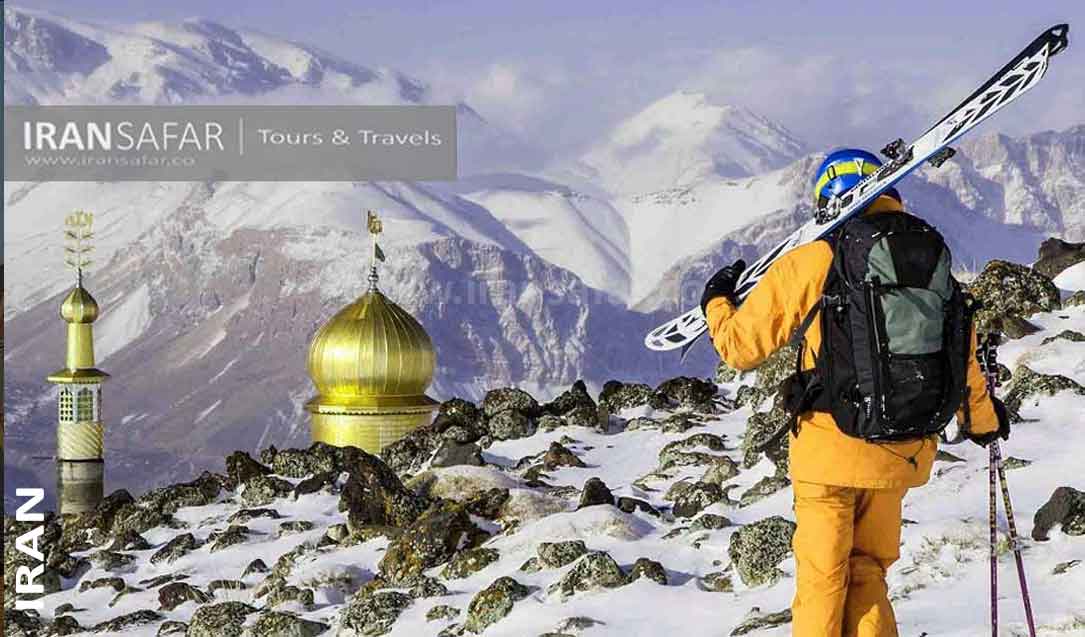

This is very useful to me! I felt ignorant about travel to Iran but now I know much … We can not trust western media and fake news about Iran. Please provide more information on visa to Iran.
Dear Min
Thanks for your message.
Yes, you can travel to Iran as a US citizen. We will contact you soon via an email enclosed with guideline on Iran Visa and Iran travel tips.
Regards
This was very useful for me. I am going to travel to Iran in September 2023. Can you help me to know about how can I go as a US citizen? I am originally from SOUTH KOREA and am a US passport holder. Can you arrange my trip in Iran? Many thanks in advance.
A lot of useful information for somebody travelling to Iran first tiem. To be honest I’m very excited to get to know the country and its people from my own opinion instead of our media. And though I only learned a bit of farsi words from Afghan people here in GErmany I might try them. 🙂